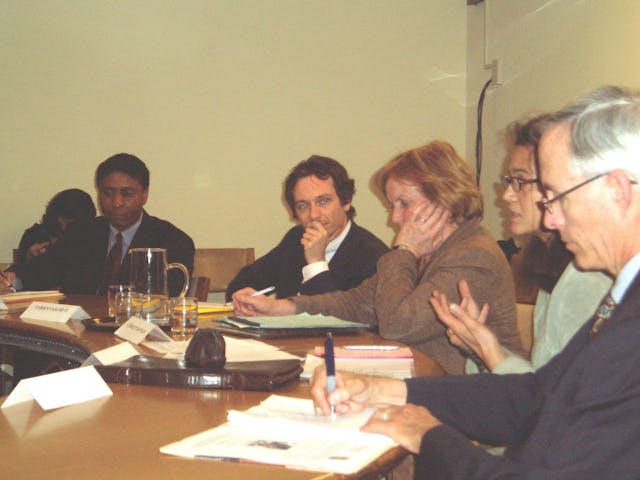Violence against women needs global attention, says panel at the U.N.
UNITED NATIONS, United States — Government and civil society representatives called for renewed attention to the issue of preventing violence against women in a panel discussion here this week.
The discussion, which was organized by the Baha'i International Community and the Christian Children's Fund in cooperation with the U.N. missions of France and the Netherlands, looked at ways that national and local communities around the world can intensify efforts to eliminate all forms of violence against women.
"Despite significant progress, violence against women and girls continues to be a global problem," said Fulya Vekiloglu, director of the Baha'i International Community's Office for the Advancement of Women. "So the effort to organize this discussion is one way to help keep this on the agenda of governments and nongovernmental organizations, and especially to focus on the implementation of recent international agreements to fight and prevent violence against women."
Panelists included Fabien Fieschi, first secretary of the Permanent Mission of France to the U.N.; Hedda Samson, first secretary of the Permanent Mission of the Netherlands to the U.N.; Mike Wessells, senior child protection adviser of the Christian Children's Fund; and Michael L. Penn, an associate professor of psychology at Franklin and Marshall College, who represented the Baha'i International Community.
The discussion was moderated by Carolyn Hannan, director of the U.N.'s Division for the Advancement of Women, UN/DESA.
Mr. Fieschi outlined the importance of a resolution passed by the U.N. General Assembly last year that called for governments and civil society to take stronger measures to eliminate violence against women.
The 2006 resolution was intensely negotiated, he said, but was nevertheless adopted by consensus. "The resolution also recognized the important role of civil society in the fight against violence against women," he said.
Ms. Samson noted that the 2006 resolution places important obligations on states to "prevent, investigate, and punish" violence against women.
She noted, however, that it also emphasizes preventive measures, such as training for health workers, teachers, law enforcement personnel, and others.
Mr. Wessells stressed the importance of engaging religious and community leaders in efforts to change social norms that allow violence against women and girls.
Communities and prevailing attitudes can be "significant barriers" to reducing violence against women, but "communities can also be vital supports for women," he said.
Dr. Penn talked about the importance of strategies aimed at changing old patterns of thinking in men, boys, and communities.
In particular, he said, legal measures to eradicate violence against women should be accompanied by local, national, and international initiatives that cultivate and inspire the human spirit and promote a consciousness of the "dignity and nobility of all people."
He emphasized that everyone has a responsibility to fight practices and attitudes that lead to violence against women. As an example, he discussed the problem of pornography becoming accepted as a legitimate form of entertainment.
"The trend towards the marketing and commercialization of pornography around the world is one that ought to concern governments, NGOs, and local communities," said Dr. Penn. A number of studies have shown that pornography socializes men into relations with women and girls that are "dangerous for their psychological, social, physical, and moral health," he said.
